#The Solace of Fierce Landscapes: Exploring desert and Mountain Spirituality
Explore tagged Tumblr posts
Text

Georgia O'Keefe, American Artist, 1887-1986:: Chama River, Ghost Ranch 1937
Oil on Canvas, 32.25 × 16 in.:: New Mexico Museum of Art, Santa Fe, New Mexico, USA
[A CELEBRATION OF FEMALE ARTISTS]
* * * *
“To love someone is to grant him or her the gift of one’s pure and undivided attention, without preconceived expectations of what the other person needs, what we imagine to be best in the situation, what particular results we want to engineer.” ― Belden C. Lane, The Solace of Fierce Landscapes: Exploring Desert and Mountain Spirituality
#Georgia O'Keefe#female artists#Ghost Ranch#New Mexico#Belden C. Lane#The Solace of Fierce Landscapes: Exploring Desert and Mountain Spirituality#quotes#love#attention
35 notes
·
View notes
Photo
* * * *
“People who pay attention to what matters most in their lives, and who learn to ignore everything else, assume a freedom that is highly creative as well as potentially dangerous in contemporary society. Having abandoned everything of insignificance, they have nothing to lose. Apart from being faithful to their God, they no longer care what happens to them.” ― Belden C. Lane, The Solace of Fierce Landscapes: Exploring Desert and Mountain Spirituality
+
“Our conditioning as members of a consumer society prevents us from abandoning hope that, with sufficient planning, we might yet be able to see and do everything. To move slowly and deliberately through the world, attending to one thing at a time, strikes us as radically subversive, even un-American. We cringe from the idea of relinquishing, in any moment, all but one of the infinite possibilities offered us by our culture. Plagued by a highly diffused attention, we give ourselves to everything lightly. That is our poverty. In saying yes to everything, we attend to nothing. One only can love what one stops to observe. “Nothing is more essential to prayer,” said Evagrius, “than attentiveness.” ― Belden C. Lane, The Solace of Fierce Landscapes: Exploring Desert and Mountain Spirituality
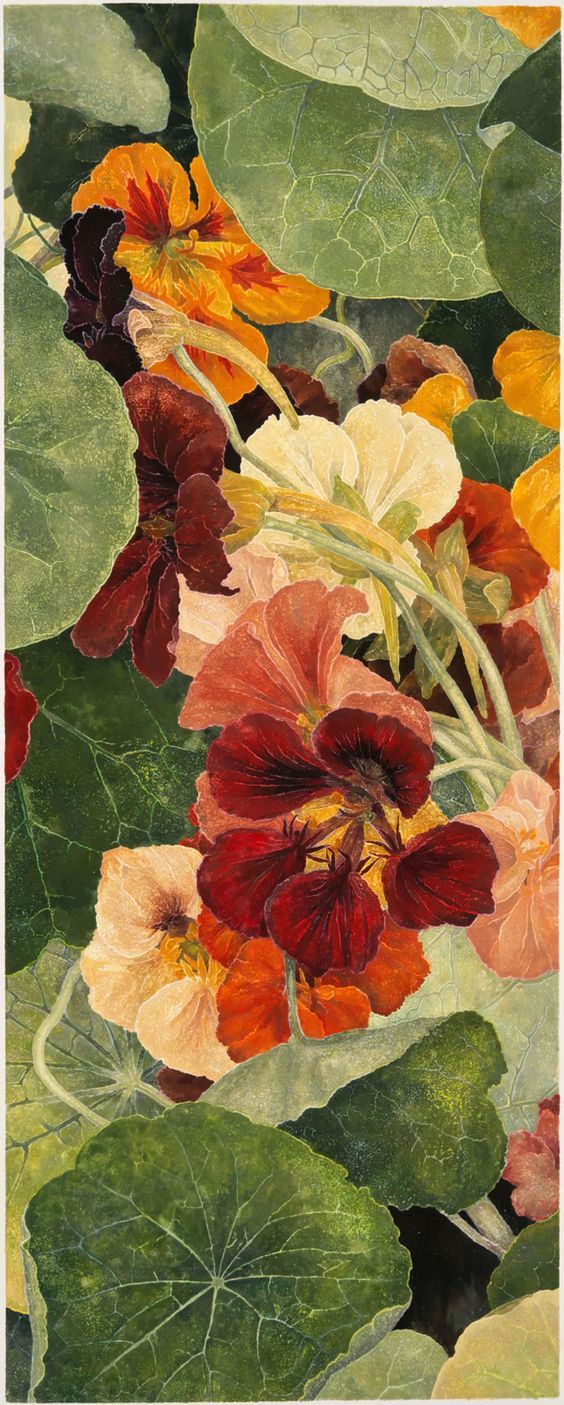
Cressida Campbell
Nasturtiums, 2014
woodblock print, watercolour paint on stonehenge paper, 114 x 45cm
#quotes#Belden C. Lane#The Solace of Fierce Landscapes: Exploring Desert and Mountain Spirituality#Nasturtiums#about art#flowers#Cressida Campbell
2K notes
·
View notes
Text

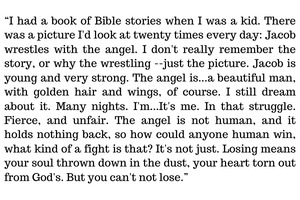
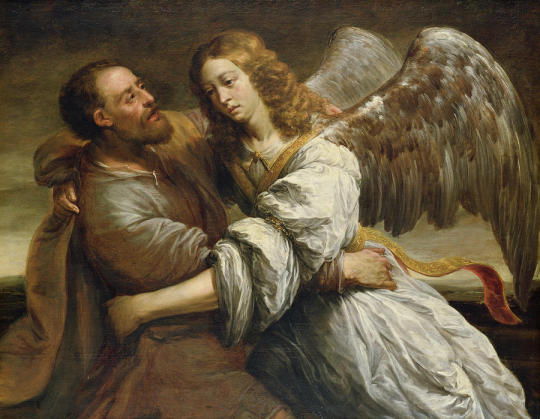


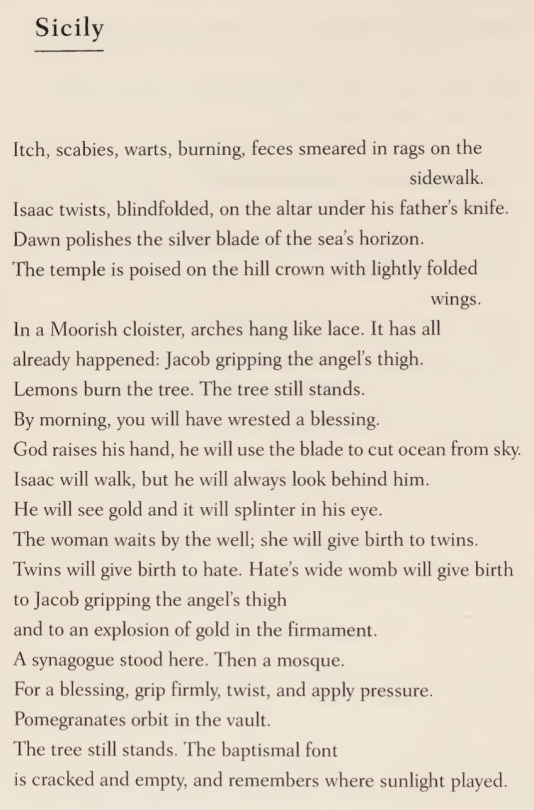
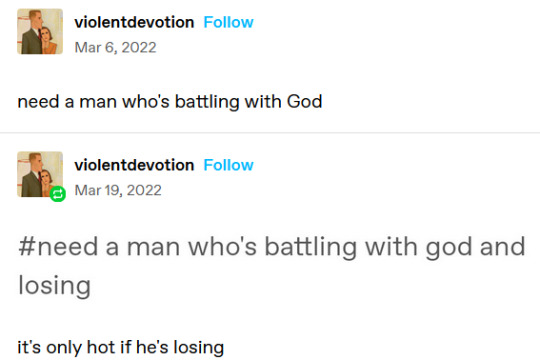




WRESTLING WITH THE ANGEL
Louise Glück, Persephone the Wanderer / Tony Kushner, Angels in America, Part One: Millennium Approaches / Jürgen Ovens, Jacob Fighting the Angel / Hermann Hesse, Demian / Léon Bonnat, Jacob Wrestling the Angel / Rosanna Warren, Departure: Poems / x / Batman v Superman: Dawn of Justice / Eugène Delacroix, Jacob Wrestling with the Angel / Belden C. Lane, The Solace of Fierce Landscapes: Exploring Desert and Mountain Spirituality / Alexandre-Louis Leloir, Jacob Wrestling with the Angel
#louise glück#hermann hesse#bonnat#dc#batman v superman#rosanna warren#tony kushner#superman#batman#bruce wayne#clark kent#belden c lane#delacroix#superbat#leloir#jürgen ovens#web weaving#compilations#jacob wrestles with the angel#stone‚ fallen among flowers
179 notes
·
View notes
Text
"In the aboriginal lands west of Alice Springs in the desert of central Australia, one easily recognizes a connection between geography and the spiritual life. Aboriginal peoples traverse the sacred landscape by following invisible song-lines, singing — as they walk — the songs first sung by their ancestors in an ancient dreamtime beyond memory. They name (and 're-create') every characteristic of their hard and thirsty land — rocks, caves, desert brush, and water-holes — through the habitus, or ritualized way of perceiving reality, they bring to it. They know that to 'dwell' in a place creatively over an extended period of time is to conduct oneself according to a custom or habit that draws meaning from the particularities of the environment.
Bruce Chatwin, a British travel writer fascinated with Australia, tells of giving a ride in his Land Cruiser to an aboriginal friend on a dusty road in the outback. The aboriginal man was on pilgrimage, engaged in a dream trek aimed at restoring meaning to his own life as well as to the landscape. Driving at twenty-five miles an hour, Chatwin noticed the man frantically jumping back and forth from one window to the other, chanting the place-names of his songline as quickly as possible. Suddenly he realized his mistake as a driver, and slowed the car down to the four-mile-an-hour pace of a walker so that the man's song could be sung at a proper and comfortable rate. Only in this way could the land be adequately honored and their entry into it together made spiritually possible."
- Belden C. Lane, from The Solace of Fierce Landscapes: Exploring Desert and Mountain Spirituality, 2007.
#belden c. lane#quote#quotations#anthropology#australia#aboriginal peoples#geography#place names#dwelling#ritual#ceremony#slow down
109 notes
·
View notes
Quote
In many ways, death would have been far easier to accept than love. It always is. Ever distrustful of grace, I assent more readily to being destroyed than to being loved.
Belden C. Lane, The Solace of Fierce Landscapes: Exploring Desert and Mountain Spirituality
5 notes
·
View notes
Text









tao te ching 4.1–10 - lao tzu // the solace of fierce landscapes: exploring desert & mountain spirituality - belden c. lane // tao te ching 14.10–16 // the play of negativity: an exploration of an apophatic discourse in daoist philosophy & negative theology - ellen ying zhang // “track” - tomas tranströmer trans. robert bly // tao te ching 43.1–2 // “burning the old year” - naomi shihab nye // tao te ching 1.1–2 // “unsaid” - a. r. ammons
hole theory/apophatic theology tumblr should talk more about taoism
#parallels#my comps#taoism#daoism#running up that hill#hole theory#web weaving#comparatives#lao tzu#tao te ching#words
43 notes
·
View notes
Text
The Solace of Fierce Landscapes: Exploring Desert and Mountain Spirituality
Devine love is incessantly restless until it turns all woundedness into health,
all deformity into beauty,
all embarrassment into laughter.
- - Belden C. Lane - -
1 note
·
View note
Text
Centuries ago, in a desert community of monks – or so the story goes - the brothers chose one of their number to go each day to a distant town to beg. It was always hot as he returned home after long hours of abuse in the city, bringing whatever food or money he’d been able to beg. But day after day in the late afternoon sun he re-crossed the desert with joy, never complaining. God marveled at the old monk’s faithfulness and, in response, created every evening there in the desert a well of cold water to refresh him on his way back across the sand.
The monk was profoundly grateful for the gift, but returned even greater glory to God by choosing not to receive it. Thinking himself unworthy of miracles, he always passed by the well, stopping only to express his thankfulness and joy. Later each night as he lay down to sleep, he’d look up through the small window of his cell to see a single bright star in the sky, knowing God had placed it there just for him. He slept with the greatest peace.
And so the man counted out the years of his life. Eventually the brothers chose a younger man to go along with him, to learn the work he soon would no longer be able to perform. The two of them set off for the city on their first day together.
The young monk found it hard persisting in begging, accepting abuse from people, and especially enduring the heat returning across the desert in the afternoon sun. But when he saw the well of cold water, something he hadn’t noticed on the trip earlier that morning, he quickly ran to it and drank deeply with the greatest appreciation.
Meanwhile, the old monk was torn. If he refused to drink as usual - and told the young monk why – the young man would feel ashamed of his own impulsiveness, not having been as devout as the revered older brother. But then again, if he drank, he wouldn’t be offering back the same gift to God he’d been able to give with joy all these years. Finally he thought of the young monk and ran to drink with him.... to the glory of God.
The rest of their way back home that evening, the old brother was a little more silent than usual. He feared that maybe he’d disappointed God by what he’d done, by drinking the water. But as he lay down to sleep that night, looking up through the small window of his cell, he saw the whole sky lit with stars just for him. The joy was too much to contain. They found him dead next morning. He’d slept with the greatest peace. And if they’d been able to see the words that last fell from his lips, they might have found the words from Hosea that love is always better than sacrifice.
Quoted from: The Solace of Fierce Landscapes: exploring desert and mountain spirituality Belden C. Lane OUP 1998
0 notes
Text

The beginning of the Gospel According to John from a Book of House illustrated by Barthelemy van Eyck (Provence, c 1440). The Pierpoint Morgan Library, New York, MS M.358: Folio.13
[Robert Scott Horton]
* * * *
“Only at the periphery of our lives, where we and our understanding of God alike are undone, can we understand bewilderment as occasioning another way of knowing.” ― Belden C. Lane, The Solace of Fierce Landscapes: Exploring Desert and Mountain Spirituality
+
“Simone Weil was surely right when she asked, “Isn’t it the greatest possible disaster, when you are wrestling with God, not to be beaten?” God’s invitation to the spiritual life is a call to the high-risk venture of being loved more fiercely than we ever might have dreamed.” ― Belden C. Lane, The Solace of Fierce Landscapes: Exploring Desert and Mountain Spirituality
#Robert Scott Horton#Gospel According to John#Book of House#Barthelemy vcan Eyck#Pierpont Morgan Library#Belden C. Lane#The Solace of Fierce Landscapes: Exploring desert and Mountain Spirituality#quotes
8 notes
·
View notes
Text

Crispin Valladares Art: The Mocking Smile
In the CREE, Center for Rehabilitation and Special Education, institution dedicated to the physical and psychological rehabilitation of those who need therapies due to an accident or illness - it also has two homes for children - there is the mural "There will be no more crying" by the late artist Crispin Vayadares Art Llama attention the representation of cats instead of humans. In this detail, we see a doctor cat healing his patient who has an injured leg. There are pills, a syringe, wands, a stethoscope, and a pot of hot water, Istmeño home remedy. What catches the attention of these feline characters the most are not objects or circumstances, but their mocking and challenging laughs that reminds us of the Laughing Cat with its body that appears and disappears, leaving behind at last its huge smile. Cats have always been symbols of eternity because of their superhuman ability to survive almost anything either for their agility or their cleverness or their feline style. The mocking smiles we see throughout the frame is defying steroids, the ultimate mockery, to death. Life will have its beliefs, but through healing like what the CREE offers under the direction of Dr. Tomás Cervantes and the Oaxaca State and Federal DIF, we can not only extend life, but also fully enjoy the life we have. The body disintegrates, but the attitude and hope orange never, and the smile we still perceive until the end.
Detail of the mural "There will be no more crying", at the CREE, San Bartolo Coyotepec, 3 m x 6 m. 2010
[h/t Robert Scott Horton]
* * * * *
“Divine love is incessantly restless until it turns all woundedness into health, all deformity into beauty, all embarrassment into laughter. In biblical faith, brokenness is never celebrated as an end in itself.” ― Belden C. Lane, The Solace of Fierce Landscapes: Exploring Desert and Mountain Spirituality
#There will be no more crying#healing#cats#CREE#Center for Rehabilitation and Special Education#quotes#Belden C. Lane#The Solace of Fierce Landscapes: Exploring Desert and Mountain Spirituality
4 notes
·
View notes
Text

In 1558 fray Bernardino de Sahagún was commissioned by the tenth provincial of the Franciscans, fray Francisco de Toral, to write about what could be useful to maintain the "Christianity of the naturals of New Spain".
Sahagún began his research and compiled, in writing and with paintings, everything related to the life and culture of the ancient nahuatl-speaking peoples of the center of Mexico: deities, parties, astrology, holes, philosophy, history of some lords, customs, flora, fauna and finally, episodes of the conquest from Mexico. This information was placed in 12 volumes written in two parallel columns: the original in náhuatl to the right and the Spanish translation to the left; and is one of the most important historical sources to know the history of ancient Mexico.
This codice is called this because it is preserved in the Laurenciana Medicea Library in Florence, Italy, it is a copy sent by Fray Bernardo of Sahagun to Rome with Father Jacobo de Testera to be delivered to the Pope in 1580.
The copy of the Florentine Code presented here was commissioned by Francisco del Paso and Troncoso, during his stay in Europe between 1905 and 1907. Currently kept in the National Library of Anthropology and History, Dr. Eusebio Dávalos Hurtado. Meet him at the INAH Media Library.
Copy of Florentine Codex
[Robert Scott Horton]
* * * *
“Our conditioning as members of a consumer society prevents us from abandoning hope that, with sufficient planning, we might yet be able to see and do everything. To move slowly and deliberately through the world, attending to one thing at a time, strikes us as radically subversive, even un-American. We cringe from the idea of relinquishing, in any moment, all but one of the infinite possibilities offered us by our culture. Plagued by a highly diffused attention, we give ourselves to everything lightly. That is our poverty. In saying yes to everything, we attend to nothing. One only can love what one stops to observe. “Nothing is more essential to prayer,” said Evagrius, “than attentiveness.” ― Belden C. Lane, The Solace of Fierce Landscapes: Exploring Desert and Mountain Spirituality
+
“We seem to have an insatiable thirst for places that don’t exist, for griffins and wondrous dragons prowling the antipodes of a world we hardly recognize. They symbolize states of growth we haven’t yet achieved.” ― Belden C. Lane, The Solace of Fierce Landscapes: Exploring Desert and Mountain Spirituality
#Robert Scott horton#Laurenciana Medicea library#Florence Italy#quotes#Belden C. Lane#The Solace of Fierce Landscapes: Exploring Desert and Mountain Spirituality
3 notes
·
View notes
Text
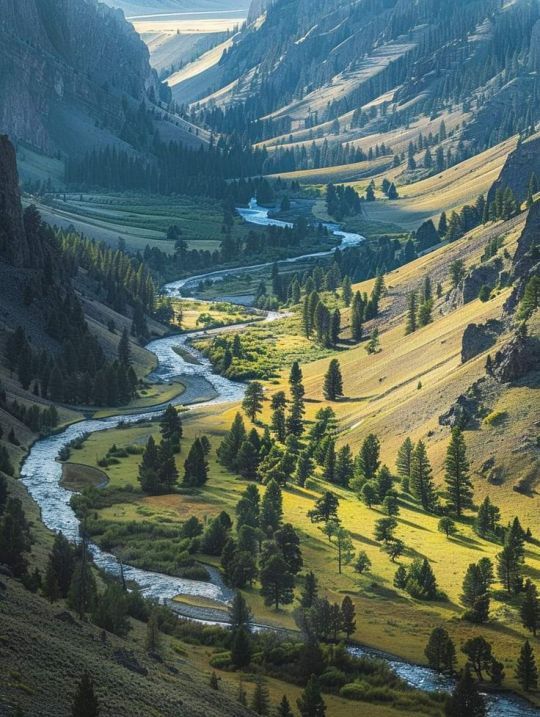
Frank Church - River of No Return Wilderness - Idaho - USA
+
The landscape's silent immensity—and the God to whom it points—is able to absorb all the grief one can give it.
Belden C. Lane, The Solace of Fierce Landscapes: Exploring Desert and Mountain Spirituality
10 notes
·
View notes
Text
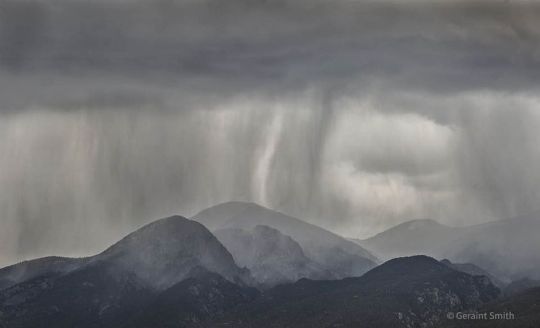
Rainfall over the Sacred Mountain, Taos, NM. Photo: Geraint Smith (Sep 3, 2023) :: [Robert Scott Horton]
* * * *
The landscape's silent immensity—and the God to whom it points—is able to absorb all the grief one can give it.
-Belden C. Lane, The Solace of Fierce Landscapes: Exploring Desert and Mountain Spirituality [beguines]
#rainfall#Taos NM#New Mexico#Geraint Smith#Robert Scott Horton#Belden C. Lane#The Solace of Fierce Landscapes#quotes
14 notes
·
View notes
Photo

tumblr
* * * *
Landscape and spirituality are not, for us, inevitably interwoven. We experience no inescapable linkage between our "place" and our way of conceiving the holy, between habitat and habitus, where one lives and how one practices a habit of being. Our concern is simply to move as quickly (and freely) as possible from one place to another. We are bereft of rituals of entry that allow us to participate fully in the places we inhabit.
We have lost the ability even to heed the natural environment, much less perceive it through the lens of a particular tradition. Modern Western culture is largely shorn of attentiveness to both habitat and habitus. Where we live—to what we are rooted—no longer defines who we are. We have learned to distrust all disciplines of formative spiritual traditions, with their communal ways of perceiving the world. We have realized, in the end, the "free individual" at the expense of a network of interrelated meanings. Belden C. Lane, The Solace of Fierce Landscapes: Exploring Desert and Mountain Spirituality [beguines]
#t rex#beguines#Landscape and spirituality#between habitat and habitus#natural environment#The Solace of Fierce Landscapes: Exploring Desert and Mountain Spirituality#Belden C. Lane
25 notes
·
View notes
Text
"Only at the periphery of our lives, where we and our understanding of God alike are undone, can we understand bewilderment as occasioning another way of knowing."
- Belden C. Lane, from The Solace of Fierce Landscapes: Exploring Desert and Mountain Spirituality, 2007.
#belden c. lane#quote#quotations#christian theology#christian mysticism#apophatic theology#zen#epistemology#humility#suffering#confusion#direct experience#understanding
34 notes
·
View notes
Text
"The desert practice of contemplative prayer abandons, on principle, all experiences of God or the self. It simply insists that being present before God, in a silence beyond words, is an end in itself.
God cannot be had, the desert tradition affirms, if this means laying hold of God by way of concept, language, or experience. God is a desert, ultimately beyond human comprehension. John Cassian defined contemplative prayer as an imperfect yet 'astonished gaze at God's ungraspable nature, something hidden' finally from human sight. Evagrius advised his students that 'when you are praying, do not shape within yourself any image of the Deity.' He knew that the God revealed in Jesus Christ is known ultimately only along the dry desert path of faith.
While this actual metaphor of 'God as desert' may not appear before the sixth century (in Pseudo-Dionysius), it stands in concert with earlier teachings of Gregory of Nyssa and is developed later in John Scotus Eriugena, Thomas Gallus, and Meister Eckhart. They unhesitatingly describe God as a desert mountain, high above all understanding.
Still other teachers in the contemplative tradition echo the author of The Cloud of Unknowing in emphasizing the need to love God 'with a naked intent,' completely apart from any of God's attributes or benefits. God is a desert to be entered and loved, never an object to be grasped or understood. In the end, we are no more able to 'possess' God than we are able to possess ourselves. It is only as we abandon every effort to control God by experiencing God, relinquishing even the grasping self (always anxious to add the Deity to its store of personal acquisitions), that the mystery of meeting God beyond experience ever becomes possible."
- Belden C. Lane, from The Solace of Fierce Landscapes: Exploring Desert and Mountain Spirituality, 2007.
#belden c. lane#quote#quotations#apophatic theology#christian mysticism#christian theology#deserts#contemplative prayer#nominalism
9 notes
·
View notes